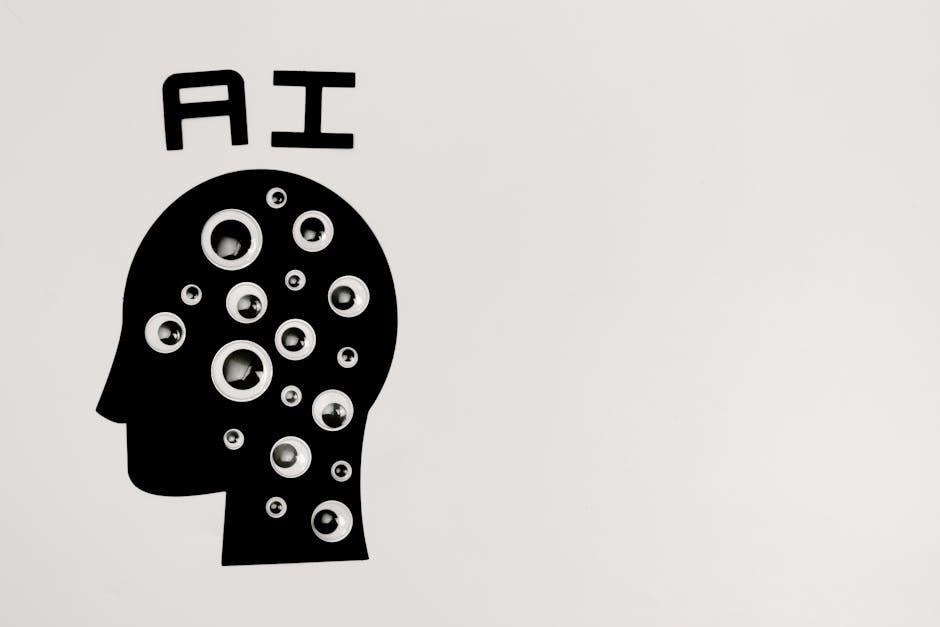
the coddling of the american mind pdf
This book, co-authored by Greg Lukianoff and Jonathan Haidt, explores how well-meaning but flawed ideas are undermining resilience and intellectual diversity among young Americans.
Overview of the Book’s Central Argument
The book argues that well-intentioned but misguided ideas are harming young Americans by fostering fragility and intolerance. Authors Greg Lukianoff and Jonathan Haidt identify three “bad ideas”: the belief that what doesn’t kill you makes you weaker, the notion that emotions should always be trusted, and the view of life as a battle between good and evil. These ideas, they claim, are undermining resilience and intellectual diversity. The authors link these concepts to rising mental health struggles and the decline of free speech on campuses. They contend that societal factors like political polarization and social media amplify these issues, creating a culture of fear and division. The book calls for a return to open dialogue and the cultivation of mental and intellectual resilience.
Authors’ Background and Expertise
Greg Lukianoff, a renowned First Amendment attorney, and Jonathan Haidt, a celebrated psychologist, bring unique expertise to their analysis. Lukianoff, as president of the Foundation for Individual Rights and Expression (FIRE), has extensive experience advocating for free speech on campuses. Haidt, a professor of ethical leadership at New York University, specializes in moral psychology and cultural trends. Their collaboration combines legal acumen and psychological insight, offering a comprehensive perspective on the challenges facing American youth. Both authors are widely published and respected in their fields, with Haidt’s work on moral foundations and Lukianoff’s advocacy for academic freedom providing a robust foundation for their arguments.

The Three Bad Ideas
The book identifies three harmful ideas: fragility, emotional certainty, and a binary view of good vs. evil, which hinder resilience and constructive dialogue in society.
What Doesn’t Kill You Makes You Weaker
This idea challenges the notion that avoiding challenges and difficulties protects individuals, instead arguing it fosters fragility. Modern culture often prioritizes comfort over resilience, leading to increased sensitivity and decreased ability to cope with stress. Educational institutions and parenting styles that shield children from adversity unintentionally prevent them from developing emotional and psychological strength. By avoiding failure or discomfort, individuals miss opportunities to learn and grow. This mindset contributes to rising mental health issues, as young people struggle to navigate life’s inevitable challenges. The authors emphasize that embracing adversity and learning from failure are essential for building resilience and thriving in an unpredictable world.
Always Trust Your Feelings
The idea that “always trust your feelings” is presented as a harmful untruth that discourages critical thinking and intellectual humility. By prioritizing emotions over reason, individuals often become overly sensitive to perspectives that challenge their beliefs. This mindset fosters a culture of outrage and closed-mindedness, as people increasingly view opposing views as personal attacks rather than opportunities for growth. The authors argue that this approach undermines the development of emotional resilience and fosters polarization. By encouraging students to rely solely on their feelings, educational institutions inadvertently promote intolerance and hinder constructive dialogue. This idea, rooted in good intentions, ultimately stifles personal and intellectual development, leading to a generation less equipped to engage with diverse viewpoints and navigate complexity. The authors emphasize the importance of balancing emotions with reason to cultivate open-mindedness and resilience.
Life Is a Battle Between Good People and Evil People
This idea, one of the three bad ideas explored in the book, suggests that the world is divided into clear categories of good and evil. While this mindset may provide moral clarity, it oversimplifies complex issues and fosters an “us versus them” mentality. Students who adopt this view often become less open to opposing perspectives, as they perceive dissent as a threat to their moral framework. This binary thinking discourages nuanced dialogue and empathy, leading to increased polarization. The authors argue that this mentality not only hinders personal growth but also undermines constructive debate, as individuals become more focused on defeating “evil” than understanding differing viewpoints. By promoting such a simplistic worldview, society risks raising a generation less capable of navigating ambiguity and complexity. The authors emphasize the need for a more balanced approach to moral reasoning. The book highlights how this mindset contributes to campus conflicts and intellectual intolerance. By encouraging students to see the world in shades of gray rather than black and white, educators can foster greater empathy and intellectual humility. This shift is essential for building a more resilient and open-minded society. The authors advocate for teaching students to engage with diverse perspectives without labeling others as inherently evil. This approach promotes understanding and collaboration, which are critical for addressing societal challenges. The book serves as a call to action for educators to rethink how they guide students in navigating moral and ethical dilemmas. The long-term consequences of this binary thinking are far-reaching, impacting not only individuals but also the broader societal fabric. The authors urge a move away from simplistic moral frameworks and toward a more nuanced understanding of human behavior and conflict. This change is vital for fostering intellectual diversity and resilience in future generations. The book provides a compelling case for why this shift is necessary and how it can be achieved. The authors’ arguments are supported by extensive research and real-world examples, making their case both persuasive and practical. Their work challenges readers to reevaluate their own assumptions and to consider the broader implications of this mindset. The book ultimately offers a roadmap for creating a more inclusive and intellectually vibrant society. The authors’ insights are particularly relevant in today’s polarized world, where the need for nuanced thinking is more urgent than ever.

The Impact on Free Speech and Mental Health
The book examines how restricting free speech on campuses contributes to rising mental health challenges, fostering a culture of fragility among students and limiting resilience.
The Role of Free Speech on Campus
Free speech on campus is essential for fostering intellectual growth and resilience, yet its restriction has become a growing concern. The book highlights how the suppression of diverse viewpoints limits students’ ability to engage with opposing ideas, ultimately hindering their cognitive and emotional development. By creating “safe spaces” and avoiding discomfort, universities unintentionally deprive students of the opportunity to develop critical thinking skills. This censorship not only undermines academic freedom but also contributes to rising mental health challenges, as students become less equipped to handle disagreement and adversity. The authors argue that exposing students to a wide range of perspectives is crucial for preparing them to navigate a complex, often contentious world.
Mental Health Challenges Among Students
Mental health challenges among students have risen significantly, with anxiety and depression becoming prevalent issues. The book attributes this partly to the “coddling” of students, where overprotection from discomfort hinders resilience. By shielding students from challenges, universities inadvertently prevent them from developing coping mechanisms. This lack of exposure to adversity can lead to increased stress and mental health struggles when students face real-world difficulties. The authors emphasize that fostering resilience through exposure to diverse perspectives and experiences is key to improving mental well-being. They argue that universities should prioritize equipping students with the tools to handle life’s challenges rather than protecting them from discomfort, which ultimately exacerbates mental health issues.

Societal Factors Contributing to the Problem
Political polarization, tribalism, and social media amplify divisions, creating an environment where students are shielded from opposing views, hindering intellectual growth and fostering intolerance to differing perspectives.

Political Polarization and Tribalism
Political polarization has intensified societal divisions, fostering a “us vs. them” mentality that discourages open dialogue. Tribalism on campuses often leads to echo chambers, where students are exposed only to views that reinforce their existing beliefs. This environment fosters hostility toward opposing perspectives, creating a culture of outrage and intolerance. The authors argue that such polarization erodes intellectual diversity, as students increasingly identify with ideological groups rather than engaging with diverse viewpoints. This trend not only hinders personal growth but also undermines the pursuit of knowledge and constructive debate, further exacerbating the challenges faced by younger generations in developing resilience and critical thinking skills.
The Influence of Social Media
Social media has become a significant factor in shaping young minds, often fostering echo chambers and amplifying outrage. Platforms prioritize sensational content, creating a culture where extreme views gain more traction. This environment discourages nuanced discussions and encourages ideological purity. The constant exposure to curated highlight reels can lead to anxiety and depression, as individuals compare their lives to others’ idealized portrayals. Moreover, social media algorithms often prioritize content that aligns with users’ existing beliefs, reinforcing tribalism and reduces exposure to diverse perspectives. This digital landscape hinders the development of critical thinking and resilience, as students become less accustomed to engaging with opposing viewpoints or coping with discomfort. The authors highlight how these dynamics contribute to a generation less equipped to navigate real-world complexities.

The Broader Implications for Education and Society
The book highlights how the coddling mindset threatens intellectual diversity, free speech, and societal resilience, urging a cultural shift to foster healthier dialogue and mental well-being.
Educational Institutions’ Role in Promoting Resilience
Educational institutions play a critical role in fostering resilience by teaching students to engage with diverse perspectives and challenges. The authors argue that universities should prioritize intellectual diversity, encouraging open dialogue and debate. By doing so, they can help students develop critical thinking skills and emotional resilience. The book emphasizes the importance of exposing students to differing viewpoints, which can counteract the harmful effects of tribalism and ideological polarization. Rather than shielding students from discomfort, institutions should create environments where constructive disagreement is valued. This approach not only prepares students for real-world challenges but also strengthens their ability to navigate complex societal issues. Ultimately, fostering resilience in education ensures students grow into capable, adaptable, and open-minded individuals.
The Future of Intellectual Diversity on Campuses
The future of intellectual diversity on campuses hinges on fostering environments where varied perspectives are welcomed and debated. The authors highlight the necessity for universities to prioritize open inquiry and dismantle echo chambers. They suggest that institutions must encourage exposure to differing viewpoints to combat tribalism and polarization. By promoting such an environment, campuses can cultivate students who are capable of engaging with complexity and uncertainty. This approach not only enriches the educational experience but also prepares students to contribute meaningfully to society. The book underscores the importance of intellectual diversity in maintaining the integrity of higher education and fostering a more inclusive, adaptive generation.
Lukianoff and Haidt urge educators and students to embrace resilience, intellectual diversity, and open dialogue. They advocate for fostering environments where challenges to ideas are welcomed, not feared.
Authors’ Proposed Solutions
Lukianoff and Haidt propose fostering resilience by teaching coping skills and encouraging open dialogue. They advocate for intellectual diversity, exposing students to diverse viewpoints to combat tribalism. By promoting free speech and challenging harmful ideas, they aim to strengthen critical thinking. The authors emphasize the importance of balancing empathy with constructive debate, urging educators to create environments where students can engage with opposing views without fear. They also suggest practical steps, such as teaching cognitive behavioral techniques to manage anxiety and fostering a culture of constructive disagreement. Their solutions aim to prepare students for real-world challenges and promote a healthier, more inclusive intellectual climate.
A Path Forward for Students and Educators
Students and educators must prioritize intellectual humility and curiosity, embracing challenges as growth opportunities. Educators should foster environments where diverse perspectives are explored without fear of retribution. Encouraging critical thinking through open discussions and debates can help students develop resilience. Students should actively seek out opposing viewpoints to broaden their understanding. By promoting a culture of engagement and respect, educators can empower students to navigate complex issues effectively. This collaborative approach aims to cultivate a generation capable of thriving in an increasingly complex world, ensuring they are equipped with the tools to succeed both academically and personally.

References and Further Reading
For deeper insights, readers can explore The Coddling of the American Mind by Greg Lukianoff and Jonathan Haidt, available as a PDF download through various online platforms. The book has been widely reviewed and discussed in academic circles, with many praising its thought-provoking analysis. Additional resources include interviews with the authors, such as Greg Lukianoff’s discussion with The Atlantic, and essays that expand on the book’s themes. Readers interested in the intersection of free speech and education can also refer to the authors’ earlier works and related studies on intellectual diversity. These materials provide a comprehensive understanding of the challenges facing modern education and society.